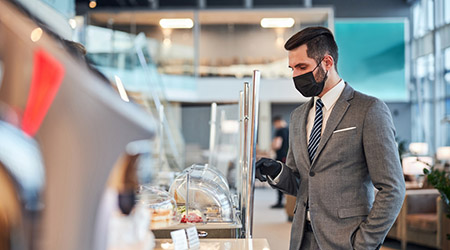Flexibility is the name of the game for any successful business operation, and that trait has never been in greater demand than for businesses navigating their way through the many challenges presented by the COVID-19 pandemic, and healthcare food services is included in this process.
As schools, businesses and restaurants shut down in March, UCLA Health still had to provide foodservice for their staff, yet under a whole new set of coronavirus precautions, according to Food Management.
In one cafeteria, a long salad bar was transformed into a makeshift mini mart that provided essential items that may have been in short supply on store shelves, including produce, eggs, milk, pasta, beans, rice, sugar, flour, yeast, hand sanitizer, toilet paper and paper towels.On Mondays and Fridays, they now also offer a toss-to-order salad station.
Both centers’ cafeterias include six meal stations including a grill, pizza, hot entree, exhibition cooking, deli bar, and soup and salad bar – now all transitioned to prepackaged or served by staff. Workers also put Plexiglas barriers at the cashier stations and placed social-distancing stickers on the floors at both the cashier stations and in all of the different areas in the servery. There are also supervisors out on the floor reminding people to keep social distance as indicated by the floor decals.
Another major change was the way that taking precautions to limit COVID-19 risk impacted the dining program’s sustainability efforts. They moved from self-serve bulk condiments to individually wrapped packages of condiments and cutlery. On the patient floors, staff were serving COVID-19 patients, and the team transitioned to batch delivery times to limit how often the team had to replace personal protective equipment (PPE).
Click here to read the article.

 Healthcare and Resilience: A Pledge for Change
Healthcare and Resilience: A Pledge for Change Texas Health Resources Announces New Hospital for North McKinney
Texas Health Resources Announces New Hospital for North McKinney Cedar Point Health Falls Victim to Data Breach
Cedar Point Health Falls Victim to Data Breach Fire Protection in Healthcare: Why Active and Passive Systems Must Work as One
Fire Protection in Healthcare: Why Active and Passive Systems Must Work as One Cleveland Clinic Hits Key Milestones for Palm Beach County Expansion
Cleveland Clinic Hits Key Milestones for Palm Beach County Expansion